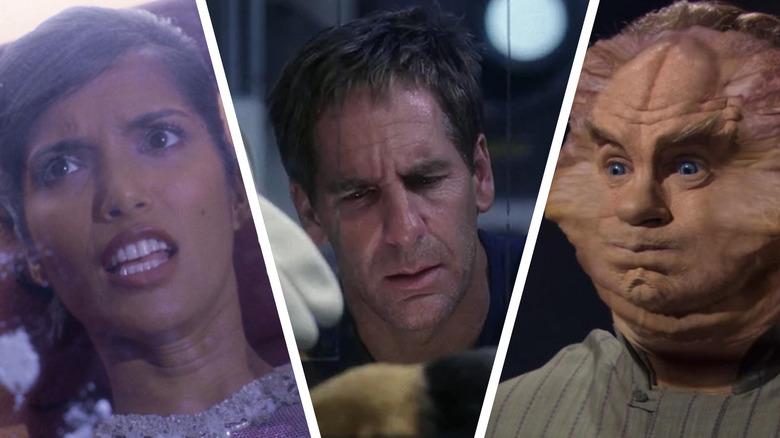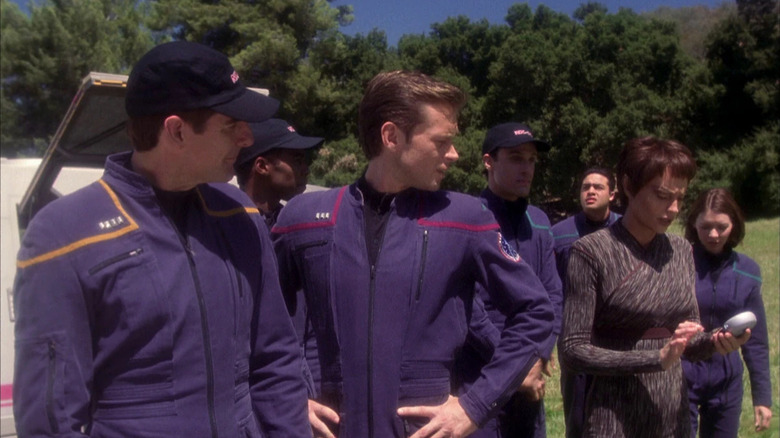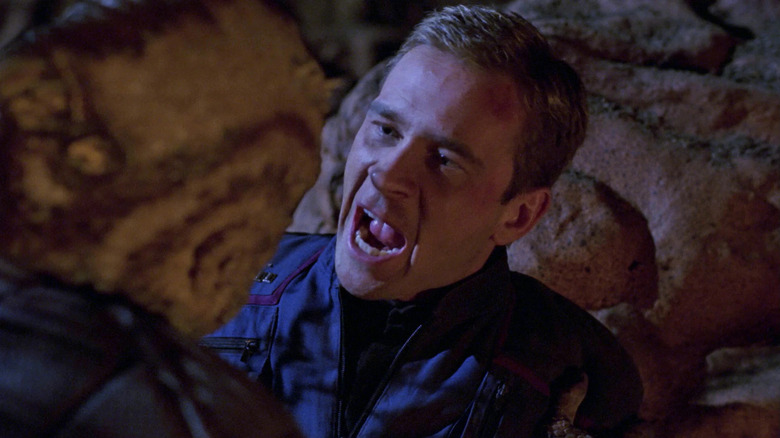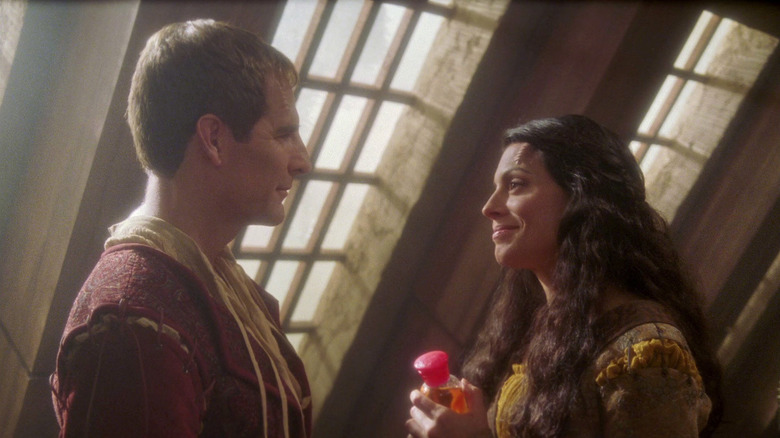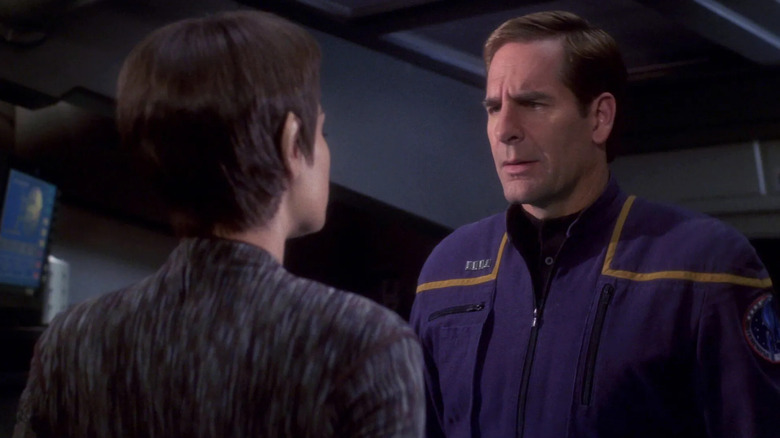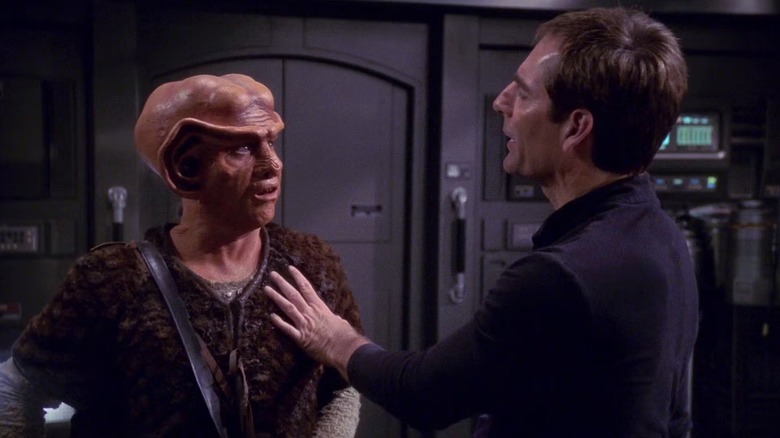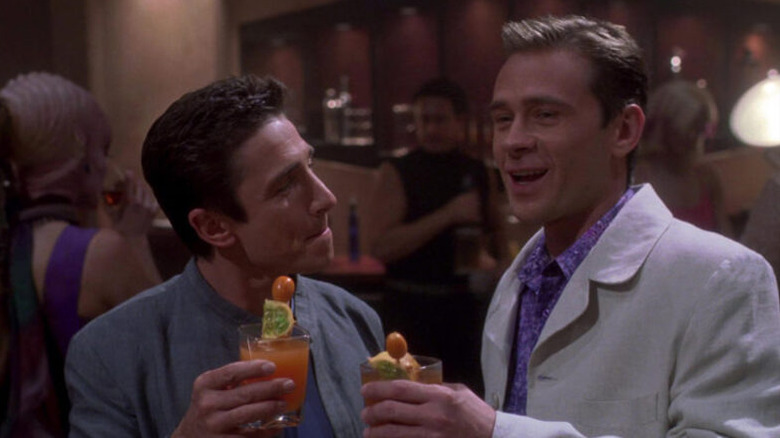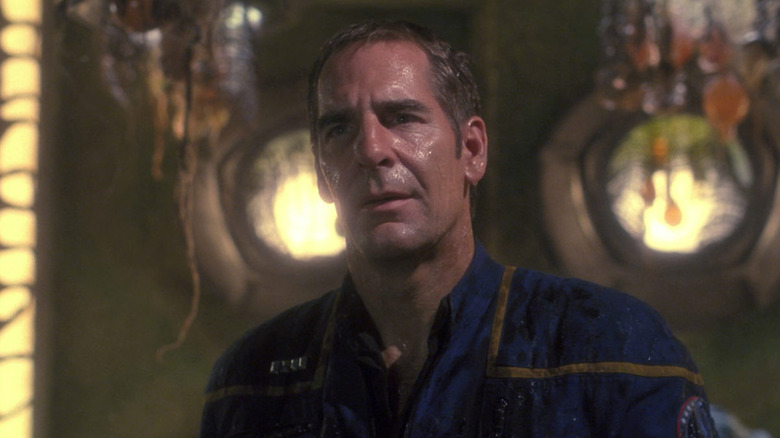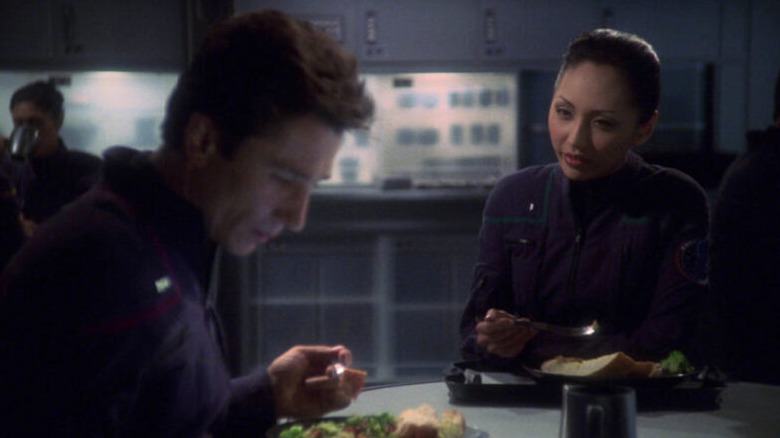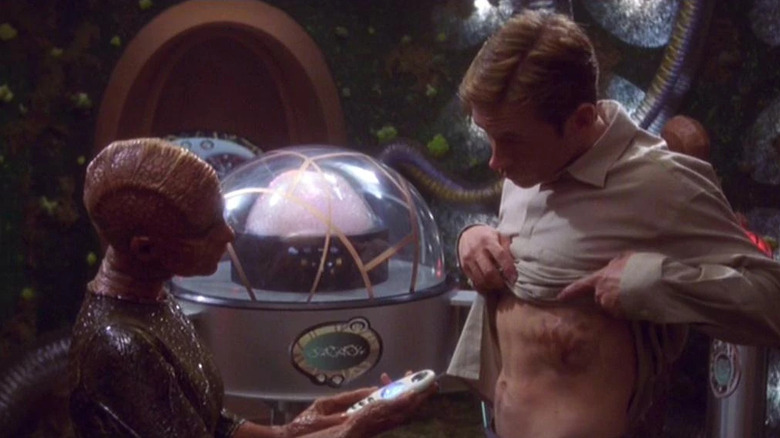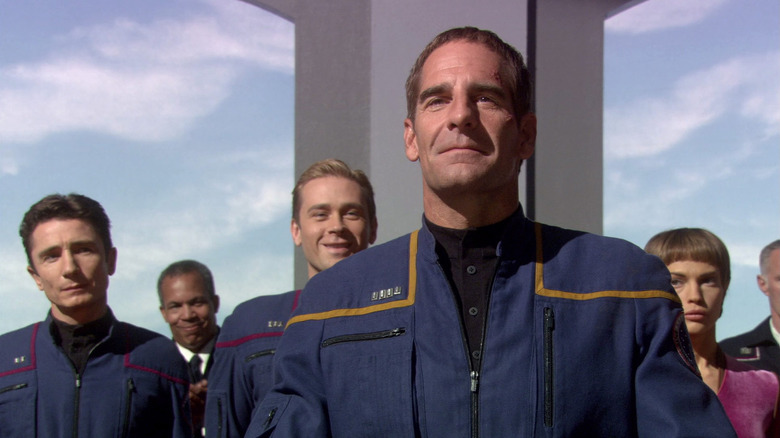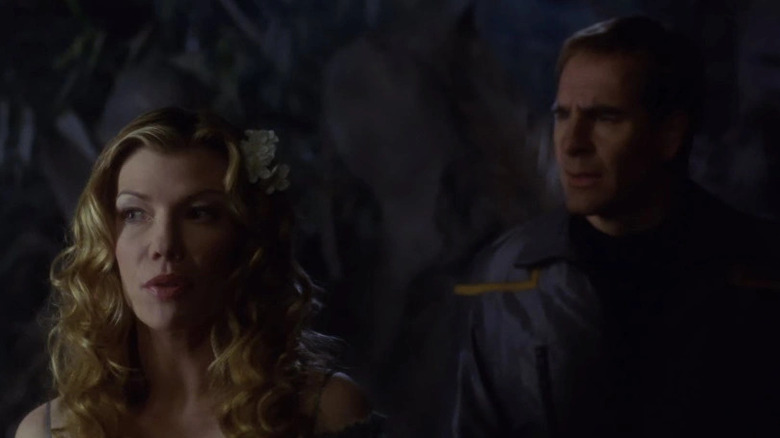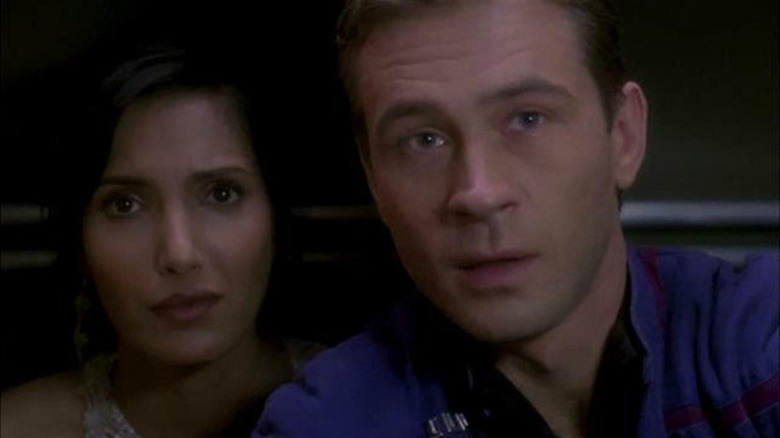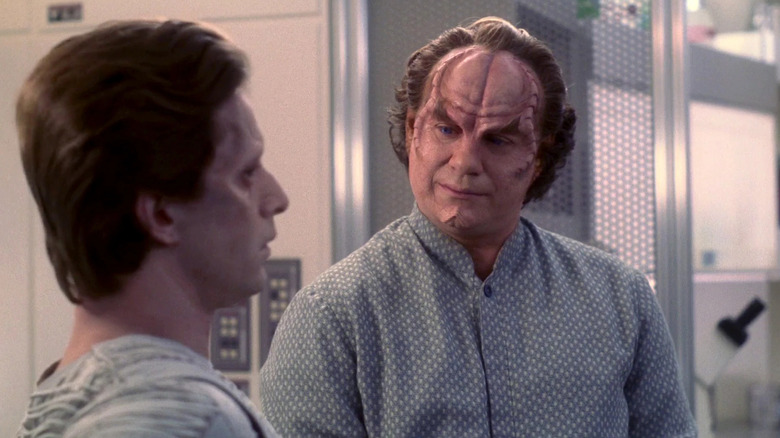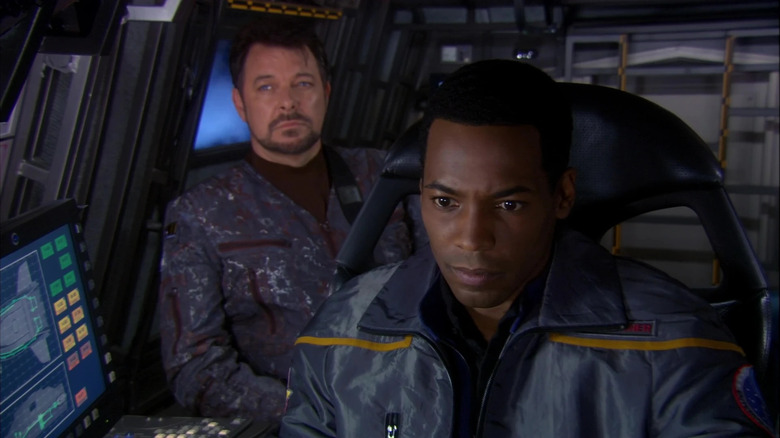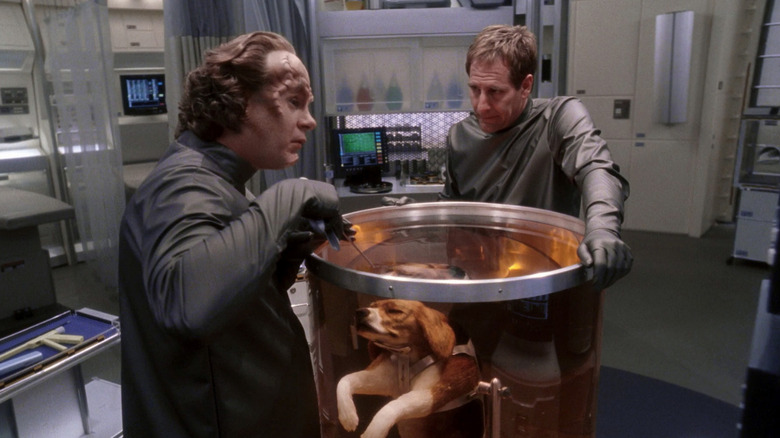The 15 Worst Episodes Of Star Trek: Enterprise, Ranked
The 2001 series "Star Trek: Enterprise" holds a strange place within the franchise's wider legacy, even 20 years after it went off the air. A prequel series set approximately a century before the events of "Star Trek: The Original Series," the show followed the adventures of Captain Jonathan Archer (Scott Bakula). Commanding the Enterprise NX-01, Archer led humanity into the cosmos as it grew accustomed to warp speed travel, far faster than the speed of light. While this introduced many familiar alien species from the franchise, it presented them in a different light, wary of humanity's first steps beyond its solar system.
However, as fun as it was to see "Enterprise" reinvent and subvert established franchise tropes, the series also had its fair share of weak episodes. We've already ranked the best "Star Trek: Enterprise" episodes, now it's time to revisit the show's less well-received moments. Here are the 15 worst episodes of "Star Trek: Enterprise" ranked down to the nadir point of the series.
15. Strange New World
Unfortunately, a significant number of entries on this list are from the show's first season, with "Star Trek: Enterprise" season 1 consistently ranked as the series' worst. The first misstep for the show is its fourth episode "Strange New World," with the Enterprise visiting a remote planet on a routine science mission. When a sudden and severe storm prevents the away team from returning to the ship, they shelter in a nearby cave. As several crew members believe there are other humanoid creatures around them, they grow suspicious that the ship's Vulcan science officer T'Pol (Jolene Blalock) is withholding information from them.
A prevalent problem with "Enterprise" is that it often tries its own spin on familiar narrative premises but doesn't bring anything fresh or better to the table. "Strange New World" feels like a loose rehash of "The Galileo Seven" from "The Original Series," complete with dissent centered at its lone Vulcan character. None of the main characters particularly feel at risk here and the distrust towards Vulcans is handled clumsily. For a show that espoused the philosophy of having infinite stories to tell, "Strange New World" is an episode mired in well-worn waters.
14. Dawn
Another episode that feels like an inferior retread of previous narrative concepts is the second season entry "Dawn." The episode centers on the Enterprise's chief engineer Trip Tucker (Connor Trinneer) who is on a test flight with a shuttle. Attacked by a hostile Arkonian pilot Zho'Kaan (Gregg Henry), Trip and his presumed enemy crash-land on a remote moon. Realizing that they need to work together to survive, Trip and Zho'Kaan overcome their differences as they await rescue before the moon's lethally hot sunrise occurs.
"Dawn" is basically "Enterprise" riffing on the 1985 cult sci-fi action movie "Enemy Mine" with its foes-turned-friends narrative setup. Like many of the early episodes of the show, there is no sense of peril and the characters on the Enterprise feel like they're spinning their wheels. Even the ticking clock angle to add suspense and an element of urgency to the story feels like it's easily dispensed with. A forgettable detour for Trip, "Dawn" never feels like the compelling survivalist friendship story it positions itself as.
13. Civilization
Though "Enterprise" takes place when the Prime Directive hadn't been created to avoid contaminating pre-warp planets' natural societal evolution, the crew still took careful lengths to explore undercover. This delicate approach informs the first season episode "Civilization," with Archer leading an away team to study a pre-industrial society living on a distant planet. While disguised, Archer and his team learn the populace is being poisoned by a toxic mining operation nearby. Investigating further, Archer realizes that the Enterprise isn't the only non-indigenous group present, with the other outsiders greedily mining the planet's resources at the expense of the locals' health.
Derivative is really the key term to describe many first season episodes in "Enterprise," and it's certainly applicable to "Civilization." Apart from Blalock's strong performance as T'Pol in the episode, there is nothing particularly noteworthy about the story or its execution. The Malurian threat introduced in the episode isn't all that menacing and is quietly dropped by the series moving forward. "Civilization" isn't an unwatchably bad episode of the series, it's just another boring installment of a show still trying to find itself in its first season.
12. Shadows of P'Jem
One of the early and effective sources of conflict and tension in "Enterprise" was the strained dynamic between the Vulcans and the Andorians. After an earlier hostile encounter with the Andorians, Archer and T'Pol are captured and held for ransom in the first season episode "Shadows of P'Jem." Trip and armory officer Malcolm Reed (Dominic Keating) lead an unauthorized rescue mission, joined by the Andorian Commander Shran (Jeffrey Combs). This occurs as the Vulcan High Command contemplates recalling T'Pol from her assignment on the Enterprise amid growing tension with humanity and the Andorians.
"Enterprise" leans into the moral shades of gray more than most preceding "Star Trek," something the Andorian-Vulcan intrigue captured beautifully. That said, the Vulcans' move to recall T'Pol feels forced and is resolved as quickly as it's suggested, while the Andorian presence feels underutilized. To top it off, the scene where Archer is awkwardly pressed against T'Pol's breasts while tied together is an out-of-place moment of juvenile slapstick undermining the whole episode. The Vulcans and Andorians are definitely among the best "Star Trek" alien races, so it's frustrating to see them both get the short shrift here.
11. Acquisition
While the Ferengi debuted as the one of the first recurring antagonists in "Star Trek: The Next Generation," they received a retconned first contact with humanity in "Enterprise." The first season episode "Acquisition" has Ferengi pirates incapacitate most of the Enterprise crew with knockout gas to steal their valuables. Unbeknownst to the raiders, Trip managed to stay conscious during the initial attack, working to revive the senior officers to retake control of the ship. Meanwhile, a revived Archer deceives the Ferengi to misdirect them and buy Trip time to turn the tables on the pirates.
"Acquisition" is essentially "Die Hard" on the Enterprise NX-01, just with well-armed European terrorists swapped out for gullible Ferengi pirates. But there's a reason why the Ferengi were a major misstep for "The Next Generation," and it's because they never really worked as serious villains, nor are they particularly funny. "Acquisition" does nothing to improve the Ferengi's reputation on either score, and it doesn't even sync cleanly with their established continuity. Ferengi-centric episodes are usually hit or miss, especially outside of "Deep Space Nine," and "Acquisition" is decidedly a miss.
10. Two Days and Two Nights
The penultimate first season episode, "Two Days and Two Nights," revolves around a much-needed vacation for the Enterprise crew. Archer leads his senior officers for shore leave on the pleasure planet of Risa, with the group separating for rest and relaxation on their own. This leads to a series of vignettes revealing how each of the characters spent their time off, with the experience ranging from mysterious and sensual to embarrassing disappointments. Back on the Enterprise, Doctor Phlox (John Billingsley) goes on his annual multi-day hibernation, supervised by T'Pol.
None of the vignettes in "Two Days and Two Nights" are particularly interesting, with the best of the bunch being Hoshi Sato (Linda Park) enjoying an amorous adventure. This is offset by Trip and Reed's boozy detour, with the two officers coming off more like drunk college students on spring break. Another drawback is that the whole episode feels cheaply thrown together, leaning into casual romance and slapstick comedy rather than the series' usual sci-fi elements. An awkward attempt to showcase most of the main characters on holiday, "Two Days and Two Nights" feels like skippable filler at best.
9. Hatchery
The entire third season of "Enterprise" featured Starfleet at war with the Xindi, a coalition of various aliens who attacked Earth. This overarching narrative serves as the backdrop for the episode "Hatchery," with the Enterprise encountering a derelict Xindi vessel containing several living eggs. While investigating the enemy ship, Archer is sprayed by the eggs and becomes increasingly obsessed with ensuring their survival, putting him at odds with the crew. Complicating matters is the presence of Starfleet commandos on the Enterprise as part of the war effort, all of which unfailingly follow Archer's erratic orders.
"Hatchery" is an entire episode that has Archer mentally compromised by the Xindi, with the tension backed up by the heightened military presence on the Enterprise. But the whole execution of the story feels like an uncomfortable detour and clumsy repositioning of Archer as a temporary adversary. Making matters worse, the season was already well underway towards its climactic confrontation with the Xindi, with the episode feeling like a stalling effort when watched in the narrative's context. A forced excuse to display an unhinged Archer, "Hatchery" is just an obstructive stumble towards the season 3 finale.
8. Silent Enemy
A lot of "Enterprise" season 1 involved the crew growing accustomed to new technology that gradually evolved into franchise mainstays. The episode "Silent Enemy" has Enterprise NX-01 still acclimatizing to the universal translator while having the ship fitted by phase cannons. This coincides with the ship entering a confrontation with a mysterious hostile that disables and boards the Enterprise in an initial skirmish. As Archer leads his crew to defend themselves, Sato tries to learn more about Reed to better celebrate his birthday.
"Silent Enemy" is all over the place, cramming in too many plot lines while trying to instill suspense with the starship repeatedly clashing with the Enterprise. But with their motives never revealed, and with so many other subplots going on, this particular enemy feels toothless. To cap it off, in trying to develop Malcolm Reed into a more interesting character, the episode somehow manages to do the opposite. Actor Dominic Keating deserved better material in playing Reed and "Silent Enemy" doesn't do him, or its titular enemy, any justice.
7. Unexpected
Yes, "Unexpected," the first season episode where Trip somehow ends up pregnant, was always going to earn a spot on this list. For the unfamiliar, the episode has Trip visiting an alien ship to repair it, taking injections to adapt to the ship's environments. Upon returning to the Enterprise, Trip discovers that he has become pregnant after spending time with the other ship's engineer. As Archer tries to resolve the surprise issue, they become embroiled in a tense stand-off with the Klingons.
It's not necessarily that "Star Trek: Enterprise" couldn't handle its more comedic episodes, it's just that its success rate for them was considerably weaker compared to its franchise counterparts. This is painfully evident in "Unexpected," which is a riff on the Arnold Schwarzenegger comedy "Junior" at best and a screwball slog at worst. The entire premise hinges on the audience finding the prospect of Trip getting pregnant funny, with any humor to be derived from this concept never clicking. An attempt at comical relief at Trip's expense, "Unexpected" is an episode that's so bad it almost needs to be seen to be believed.
6. Home
Something that may not be recognized as readily these days is that "Star Trek: Enterprise" premiered mere weeks after the 9/11 terrorist attacks. "Enterprise" reflected the rapidly changing post-9/11 world in its tone and larger narratives, most notably with the aforementioned Xindi War storyline. The fourth season episode, "Home," takes place in the immediate aftermath of the devastating conflict, with the crew welcomed back on Earth as the Enterprise undergoes refitting. As Archer rekindles an old romance and Phlox faces prejudice for his extraterrestrial heritage, the love triangle between Trip and T'Pol escalates.
The problem with "Home" is that it commits the cardinal sin of any major form of entertainment — it's boring. As with "Two Days and Two Nights," the vignettes that get the most screentime are the ones that drag on the longest. But coming off a multi-episode storyline that paralleled the escalating War on Terror, this is an entry that did little to reflect on those geopolitical themes. The Xindi War felt like a meandering commentary on the post-9/11 world, with the denouement provided by "Home" as the final nail in the thematic coffin.
5. Rogue Planet
Another common problem throughout "Star Trek: Enterprise" season 1 is that, while it presents several interesting story ideas, it never quite knows what to do with them. This certainly applies to the episode "Rogue Planet," with the Enterprise NX-01 encountering a planet unattached to any solar system. Archer leads an away team to explore this strange world, learning that the planet has been used as a hunting ground by visitors for generations. Archer realizes the hunting party is stalking an intelligent species for their quarry.
On paper, "Rogue Planet" has a nominally intriguing premise but whiffs on any moral commentary or excitement that could've been derived from it. Archer's practically surreal sightings of the hunting party's quarry and the final reveal of their true form feels like an out of place fever dream. Any conflict that the episode itself presents feels oddly muted, which is perhaps a quality you don't want for a story about interplanetary big game hunters. Another misfire from season 1, "Rogue Planet" squanders any potential that its narrative concepts possessed in a turgidly delivered episode.
4. Precious Cargo
In the years since "Enterprise" has concluded, the cast has publicly shared their candid reflections about the series, including John Billingsley. The actor's least favorite "Enterprise" episode is the second season installment "Precious Cargo," which has the Enterprise meet a sketchy cargo vessel. The crew learns that the ship was transporting Princess Kaitaama (Padma Lakshmi) in stasis, plotting to hold her for ransom. Archer and T'Pol search for the kidnappers after they flee, while Trip finds himself growing closer to Kaitaama despite their mutual acrimony.
This observation has been made before, but "Precious Cargo" is basically just an uninspired pastiche of "Elaan of Troyius" and "The Perfect Mate" from preceding "Star Trek" shows. The involvement of kidnappers is a new wrinkle, but somehow made into a boring addition for an overdone narrative. Most damaging of all is the complete lack of chemistry between Trip and Kaitaama, with their romantic subplot feeling obligatory and flaccid in its delivery. Another interminably dull episode, "Precious Cargo" goes through the motions without any sense of personality or vested interest in its own story.
3. Dear Doctor
Given his Denobulan heritage and status as a non-Starfleet physician on board the Enterprise, Phlox brings an interesting perspective to the crew. Unfortunately, these unique qualities, including how he approaches practicing medicine as opposed to humans, are so rarely capitalized on. The most egregious example of this is the first season episode "Dear Doctor," with the Enterprise finding a pre-warp species, the Valakians, suffering from a mysterious ailment. Phlox determines that the Valakians' gene pool has become stagnant, resulting in the medical condition and opines that evolution should run its course, but Archer has other ideas.
"Dear Doctor" gives Phlox his first true moral dilemma but it's one that Archer finds a cop-out for in the episode's climactic scene. Though Billingsley shines as Phlox, he's given subpar material to work with that whiffs on the consequences and implications of his ethical conundrum. Archer awkwardly musing that Starfleet would benefit from having a Prime Directive policy in place to inform these scenarios is also as lazily unsubtle as the series gets. A morality play that doesn't ever quite know what stance it wants to take, "Dear Doctor" is the first season at its meandering worst.
2. These Are the Voyages...
Anyone who knows "Star Trek: Enterprise" knew that the widely maligned series finale "These Are the Voyages..." was going to appear somewhere on this list. The episode is a story-within-a-story as Will Riker (Jonathan Frakes) uses the Enterprise's holodeck in the 24th century to revisit the Enterprise NX-01's final mission. As Archer prepares to give a speech marking the founding of the United Federation of Planets, he agrees to help rescue Shran's kidnapped daughter. Though successful, the mission results in Trip's death, who sacrifices his life to stop the kidnappers.
Fans were vocally annoyed that the series' send-off essentially made them supporting characters to Riker's holodeck program during his own crisis of command. This crushing disappointment included Scott Bakula, who wasn't thrilled by the direction that the finale went in for his farewell to Archer. Intended as a coda to the entire era of "Star Trek" that began with "Star Trek: The Next Generation," "These Are the Voyages..." leaves "Enterprise" in the lurch. Widely considered one of the worst "Star Trek" series finales, "These Are the Voyages..." has the show's four-season journey end with a stumble across the finish line.
1. A Night in Sickbay
Look, there are some who consider the second season episode "A Night in Sickbay" as the best "Star Trek: Enterprise" episode. Though it has its defenders, we're of the mind that the episode is a self-indulgent slog to get through. While accompanying Archer on an away mission, his dog Porthos contracts a disease and upsets a sensitive diplomatic meeting by urinating on a sacred tree. Archer stalls, apologizing to the alien civilization he offended by staying with Porthos in sickbay overnight, maintaining a vigil as his dog recovers. In the process, Archer not only comes to terms with swallowing his pride but also recognizing his lingering sexual tension with T'Pol.
In trying to provide a more vulnerable portrait of Archer through how he reacts to his sick dog, "A Night in Sickbay" somehow makes him seem insufferable. From blundering into a diplomatic situation with his dog and refusing to apologize for it, Archer comes off as uncharacteristically self-centered in the episode. The moments of the episode examining Archer's repressed sexual attraction to T'Pol also comes out of nowhere, given the wider context of the story. A complete waste of time and disservice to Archer himself, "A Night in Sickbay" is the most skippable single episode in the series.
